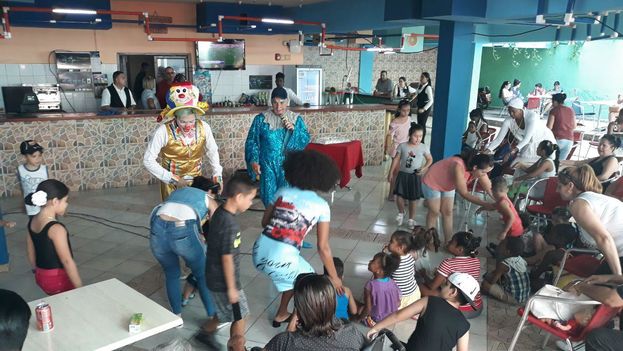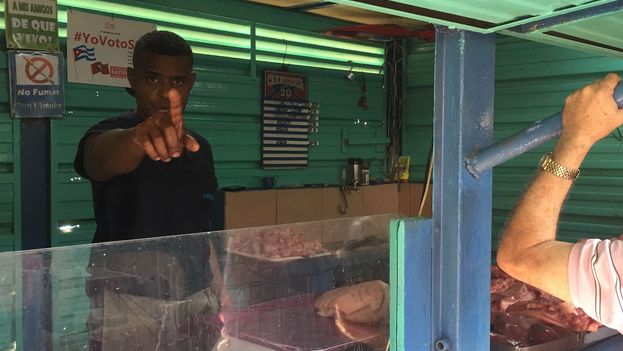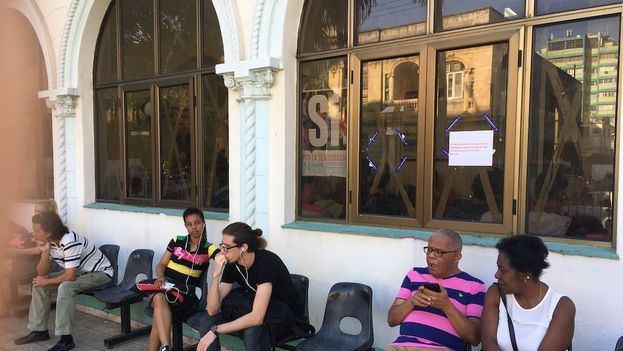
![]() 14ymedio, Havana / Camagüey | 23 February 2019 — Clown performances promoting a Yes vote on the referendum, long lines to buy food and a general apathy about voting on the new constitution shape the scene on Saturday in Cuba, a few hours before the polling places open, where government officials have more at stake than a new charter.
14ymedio, Havana / Camagüey | 23 February 2019 — Clown performances promoting a Yes vote on the referendum, long lines to buy food and a general apathy about voting on the new constitution shape the scene on Saturday in Cuba, a few hours before the polling places open, where government officials have more at stake than a new charter.
From early in the morning families have been lining up at the Coppelia ice cream parlor and people are crowding into the agricultural markets. The cinemas and theaters are running their usual programs, but the countdown for the vote this Sunday has increased police patrols in the streets, with uniformed troops and members of State Security.
In the cafeteria of the Hotel Tulipán, in Nuevo Vedado, a clown encourages the toddlers with statements about the Constitution. “Raise your hands, children, if you’re going to wake up early tomorrow,” says the blue clown, played by the actor, Noel Torriente, in a show called Children also vote for the fatherland.

A man of 36 years who offers guide services to tourists on the outskirts of the Plaza de la Revolución doesn’t seem very enthusiastic and adds that the new constitution won’t do much to put “beans on my table”. He is one among many who believe that the referendum has nothing to do with their own interests.
In the Market at 17th and K, in Vedado, there are carrots and beets, but the longest line is for pork, even though the price per pound is more than a worker earns in a day. The seller screams “No photographs!” when he sees a reporter approach; his kiosk is papered with posters for a Yes vote.

Nearby, in the doorway of the bus terminal, Miguel sells newspapers and believes that the correct thing to do is to go and vote, because he considers it “important for the country. In the assemblies everyone expresses their opinion and now you have to go and ratify,” the old man of 80 years adds.
Esperanza, a school employee, doesn’t share his opinion. “Everyone should vote No, to see the Government’s reaction.” She has already decided to reject the constitutional text but hasn’t told her colleagues and friends because she “doesn’t want to lose my job” or be marked as a “counterrevolutionary”.
Outside the Immigration and Naturalization office on calle 17 in Vedado, people barely interact to avoid any critical opinion aborting their trip abroad. The Yes propaganda is everywhere, and one joke assures that “after February 24, passports will be cheaper,” which they all pretend not to hear.

Outside Coppelia, Antonio takes in the sun. Homeless, missing a shoe and with years of living on the street, he says that he is registered to vote in Playa. “I have nothing to lose. I’m going to vote No.” He says this categorically while the passersby move away.

Hundreds of kilometers from the capital, in the streets of Camagüey, the residents are more interested in the shortage of food than in the constitutional referendum. This Saturday, there are also a larger number of police and members of State Security, dressed in civilian clothing but identifiable by their Suzuki motorcycles, traditionally used by the political police.
“Every day more products disappear,” comments Ariel Almansa, a young entrepreneur who waits in line at DiTú on 12 Plantas del Avenida Finlay, to buy two packages of chicken, a product that has been absent in previous days. Among the merchandise that has disappeared, he enumerates “oil, eggs, deodorant and condoms.”
The shortage has increased the popular malaise, a discontent that could be reflected in the ballot boxes in a rejection of the new Constitution. “I’m going to vote No because this has become unsustainable,” another client who waits in the food line tells 14ymedio. “It’s not that I reject the Constitution; it’s that this can’t continue,” she adds.
In Camagüey, the authorities have increased the presence of civil police, especially around the long food lines. “They say they’re here to avoid fighting and that now the cooking oil has been delivered,” explains Damaris Marín outside a market in the Montecarlos area.
The reappearance of the product hasn’t passed unnoticed, and many think it’s an electoral maneuver for the referendum on Sunday. “Now a little chicken and oil appear in some shops because they want us to vote Yes tomorrow,” says a woman at the bus stop on Route 19.
In these last weeks, officials have used all the resources at their disposal to promote ratification of the constitutional text. The residents in Camagüey were surprised these last days when groups of kids, with school uniforms and during school hours, ran through the streets leaving propaganda in favor of a Yes vote under doors.
Translated by Regina Anavy
_________________
The 14ymedio team is committed to serious journalism that reflects the reality of deep Cuba. Thank you for joining us on this long road. We invite you to continue supporting us, but this time by becoming a member of 14ymedio. Together we can continue to transform journalism in Cuba.
